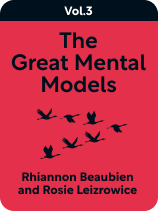

This article is an excerpt from the Shortform book guide to "The Great Mental Models Volume 3" by Rhiannon Beaubien and Rosie Leizrowice. Shortform has the world's best summaries and analyses of books you should be reading.
Like this article? Sign up for a free trial here .
What are diminishing returns? If you want to learn a new subject, should you read every book on it? Why do horror movies seem to become trite after a while?
In The Great Mental Models Volume 3, Rhiannon Beaubien and Rosie Leizrowice include diminishing returns as one of the thinking models that can boost your understanding and decision-making ability. While the law is often used in an economic context, the authors extend the principle to everyday applications.
Read more to learn about diminishing returns and how understanding them can help you understand so much more.
Diminishing Returns
What are diminishing returns? It’s the phenomenon that adding more input doesn’t always increase output. Beaubien and Leizrowice say that the model of diminishing returns describes any situation in which input increases output only up to a point: Past that point, more input has less and less effect.
For example, if you’re trying to learn about a new subject, the first few books you read will probably have a big impact on your knowledge. As you read more books, you’ll keep learning more, but not as much or as quickly as you did at first, because now you already have a base of knowledge. Eventually, you’ll reach a point where you know the field well, and each new book might only add a nuance here or there. (Shortform note: Sometimes, diminishing returns result from bottlenecks. It does little good to keep adding input to a bottlenecked system.)
The idea of diminishing returns also applies to cases where small amounts of input have a disproportionately large influence on the output. The authors cite the Pareto principle, which states that about 20% of a system’s input is more influential than all the rest, as that 20% generates about 80% of the system’s output. In the example of learning about a new subject, the first 20% of your reading might develop 80% of your knowledge base. That means that adding more knowledge takes disproportionate amounts of time and effort. Unless your goal is to become a world expert on that topic, your time and energy might be better spent elsewhere.
(Shortform note: In The One Thing, real estate entrepreneur Gary Keller suggests using the 80/20 rule to boil a large goal down into a single essential action. To do so, he says, once you’ve identified the 20%, find the 20% of that 20% and so on until you hit the “one thing” that will make a bigger difference to your goal than anything else you could do.)
In some cases, this disproportionate influence happens because the system adapts to the input. The authors cite the example of horror movies, which are constantly one-upping each other in terms of graphic violence and other scare tactics. But movie maniacs can only wield so many machetes and chainsaws before audiences get jaded and what started out as shocking becomes trite.
(Shortform note: This form of diminishing returns is also known as hedonic adaptation: When something good or bad happens to us, it affects our happiness for a while, but then the novelty wears off and we return to a baseline level of happiness. Similarly, the more you do something pleasurable, like eating a favorite food, the less that activity increases your happiness. To avoid hedonic adaptation, you can rotate through different things you enjoy or use techniques like gratitude journaling to increase your appreciation for your positive experiences.)

———End of Preview———
Like what you just read? Read the rest of the world's best book summary and analysis of Rhiannon Beaubien and Rosie Leizrowice's "The Great Mental Models Volume 3" at Shortform .
Here's what you'll find in our full The Great Mental Models Volume 3 summary :
- How to understand anything in the world by learning a finite set of rules and patterns
- A look at how humans are driven by algorithms
- Why you shouldn't be fooled by randomness






